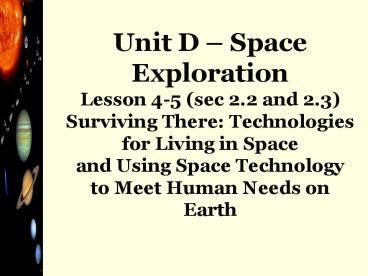Unit D - PowerPoint PPT Presentation
1 / 14
Title:
Unit D
Description:
Unit D Space Exploration Lesson 4-5 (sec 2.2 and 2.3) Surviving There: Technologies for Living in Space and Using Space Technology to Meet Human Needs on Earth – PowerPoint PPT presentation
Number of Views:37
Avg rating:3.0/5.0
Title: Unit D
1
Unit D Space Exploration Lesson 4-5 (sec 2.2
and 2.3) Surviving There Technologies for Living
in Space and Using Space Technology to Meet
Human Needs on Earth
2
A. Hazards
no protection
- there is from
the in space
atmosphere
- outer space is called a
which means there is no
vacuum
air, water or
atmosphere
- astronauts may be exposed to
cosmic and solar radiation
slide 1 of 7
3
- exposed to
meteoroids and extremes in
temperature
- have to be brought
along
air and food
- stations and shuttles are
which can cause
small and cramped
psychological problems
slide 2 of 7
4
B. Microgravity
- is the
force of attraction
between masses
gravity
- varies from
planet to planet
- is the
small
amount of gravity acting on astronauts
microgravity
- are used to the
gravity on Earth
human bodies
slide 3 of 7
5
- in orbit, astronauts experience
which can
weightlessness
1.
weaken muscles
2.
reduce depth perception
3.
bones lose calcium and become brittle
4.
heart muscle weakens since it doesnt have to
pump as hard
slide 4 of 7
6
C. Space Suits
- protect astronauts from
space suits
hazards in space
- space suits contain
1.
layers of different materials
2.
air, water
3.
heating and cooling devices
4.
waste tubes
slide 5 of 7
7
D. Water
- water may be
filtered, purified and
recycled many times during long space flights
- International Space Station (ISS) will be
recycling of its water, including
100
urine
slide 6 of 7
8
E. Air
- oxygen is made by
the
electrolysis of recycled water
-
are removed from the air
CO2, dust and microbes
-
are all controlled
temperature, air pressure and humidity
slide 7 of 7
9
2.3 Using Space Technology to Meet Human Needs
on Earth
10
A. Communication
-
depends on
wireless technology
communication satellites
eg) cell phones, satellite TV,
satellite radio
- satellites today use
digital systems
slide 1 of 4
11
B. Research Satellites
- are
designed to
stay in one position above the
Earth
weather satellites
- called
geosynchronous orbit
- ,
like
, are in
LANDSAT and RADARSAT
observation satellites
not
geosynchronous orbits
- follow ships at sea, track forest fires, report
on environmental change etc.
slide 2 of 4
12
C. Remote Sensing
-
are in a
low orbit (200 km 1000 km
altitude)
remote sensing satellites
- can take of Earths
surface or
photographs
collect data from sensing heat and radiation
slide 3 of 4
13
D. Global Positioning
-
are in orbit around Earth
24 global positioning satellites
3
- hand-held receiver picks up signal from of
the satellites and gives the
precise location
slide 4 of 4
14
Assignment
- Worksheet 6































